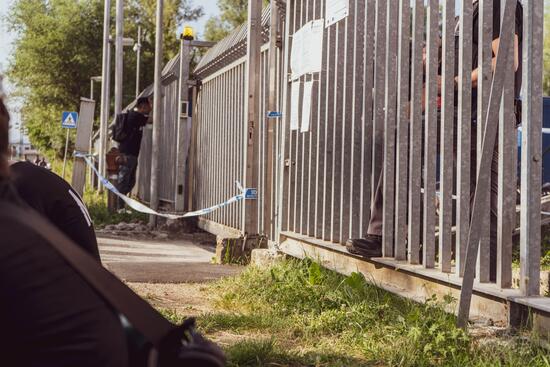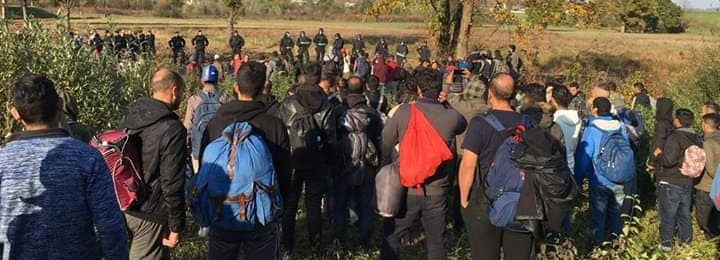SHOD PROTI NASILJU, SUŽNJELASTNIŠTVU IN RAZKROJU JAVNEGA DOBREGA: Pismo podpore prosilcem za azil // RALLY AGAINST VIOLENCE, EXPLOITATION, AND THE DESTRUCTION OF THE COMMON GOOD: Letter of Support For Asylum Seekers

Fronta za skupno dobro (FSD) je 13. junija 2025 sklicala shod proti nasilju, sužnjelastništvu in razkroju javnega dobrega pred Azilnim centrom Vič v Ljubljani kot odziv na medijsko odmevno nasilje varnostnih služb nad prosilci za mednarodno zaščito ter trpinčenje tujih delavcev s strani delodajalcev.
Civilna iniciativa Infokolpa je za shod pripravila pismo podpore prosilcem za azil z desetimi zahtevami za izboljšanje njihovih bivalnih in integracijskih pogojev.
Civilna iniciativa Infokolpa že vrsto let z delom, druženjem in skupnimi bitkami spremlja prosilce za mednarodno zaščito in druge migrante. S koreninami v avtonomnih prostorih, kot je bila Avtonomna tovarna Rog (Socialni center Rog in Second Home), je z delovanjem pričela leta 2018, ko sta slovenska policija in država predvsem na takratni južni schengenski meji s Hrvaško izvajali tako imenovane push-backe – t.j. ljudi so uradne osebe na meji v senci gozdov zavračale, jim onemogočale dostop do pravice mednarodne zaščite, občasno okradle, jim lagale, jih zavajale, predvsem pa vračale v roke in kombije so-odgovorne hrvaške policije, ki je te ljudi potem pogosto nasilno – tudi sadistično – nagnala ven iz EU, na ozemlja Bosne in Hercegovine ter Srbije.
Uvodni dobrodošlici so sledila zaprta vrata – ter zanikanje pravic in nasilje.
Že takrat so se med prebivalstvom iz različnih virov širili nestrpnost, sumničavost in strah, ki so jih protipravna ravnanja policije in države zrcalila in podpihovala.
Vendar - t.i. neregularne migracije predstavljajo le neznaten delež v celotnem spektru sodobnih migracij.
Današnje razmere na meji so nekoliko drugačne. Statistični podatki kažejo, da večina oseb, ki izrazi namero o prošnji za mednarodno zaščito, to tudi vloži, medtem ko je nastanjena v namestitvenih kapacitetah UOIM, kot je azilni center Vič. Stanje na terenu se za prosilce za azil, predvsem tiste, ki želijo ostati v Sloveniji, s pomembnimi zakonski spremembami izboljšuje, obenem pa še zmeraj spominja na pretekle dni.
To danes sporočajo prosilci iz azilnega doma – njihova pričevanja, zapisi, fotografije, avdio in videoposnetki. Ti prikazujejo ne pometene in slabo vzdrževane prostore, še posebej šokantne so podobe zanemarjenih kopalnic. Nezavidljiva je tudi prehrana – včasih le sendvič s hrenovko. Vprašljiva je kvaliteta hrane, ki je dostopna prosilcem s kroničnimi boleznimi, alergijami in drugimi stanji.
Čeprav ljudje uživajo dovolj kalorij, prehranjevanje pomeni mnogo več kot zgolj njihov vnos. Prihaja do konfliktov pri vrstah za hrano, ki so v času prenapolnjenosti centra zelo dolge.
V centru se pojavljajo bolezni, ki so značilne za prostore, kjer sočasno biva več sto oseb. Problematične so predvsem kožne in druge nalezljive bolezni, kar pretesni, umazani in slabo vzdrževani prostori le še zaostrujejo.
Navkljub naporom UOIM, da bi kapacitete centra razširil, pri tem ostaja neuspešen – predvsem zaradi strahu in nezaupanja, ki jih pri ljudeh zbujajo azilanti in tujci. Vendar je nezaupanje ljudi percepcija, ki jo je s svojimi praksami soustvarila država, razširili pa politični interesi in mediji.
Že dlje časa prosilci poročajo o nespoštljivem vedenju osebja in nasilju varnostnikov v azilnem centru Vič. Konflikti in nasilni spopadi pogosto pripeljejo do tega, da prosilce zaprejo v center za tujce v Postojni. To je zaprti visoko varovan objektu z zelo omejenim dostopom do zunanjega sveta, kjer mnogi doživljajo globoke stiske (npr. samo-poškodovanje). Osebam odvzamejo svobodo gibanja - za dobo treh mesecev z možnostjo podaljšanja za en mesec. Sprašujemo na kakšni podlagi?
Zapisniki konfliktnih dogodkov so pisani administraciji v prid, pritožbeni in odškodninski postopki prosilcev pa zapleteni in dolgotrajni.
Zato zahtevamo:
- izboljšanje prehrane – naj bo raznolika, uravnotežena in pripravljena s skrbjo;
- širitev nastanitvenih kapacitet na dostojen način – brez modrih zabojnikov;
- čiste, vzdrževane in bivanju prijazne nastanitvene prostore;
- hitrejšo možnost nastanitve na zasebnem naslovu za tiste, ki si to želijo in lahko privoščijo;
- takojšen umik nasilnih varnostnikov;
- uvedbo ustreznega in predvsem učinkovitega usposabljanja varnostnikov za delo s prosilci za mednarodno zaščito – ob podpori nevladnih organizacij;
- spoštljiv odnos osebja do prosilcev za azil, ki so ljudje in si zaslužijo dostojanstveno obravnavo;
- zagotovitev osnovnih potrebščin (čisto spodnje perilo, nogavice, čevlji, jakne ipd.) v najkrajšem možnem času;
- zunanji nadzor nad delom varnostne službe;
- brezplačen prevoz z LPP za vse prosilce za azil.
Videoposnetek shoda je dostopen na:
https://youtu.be/LUhoUxfdhi4?si=O13E9zn55M_EvrEB (Veronika N. Štefanec)
Foto: Ograja AD VIČ (Arhiv shoda, Facebook)
// ENGLISH //
The Front for the Common Good (FSD) held a rally against violence, exploitation, and the erosion of the public good on 13 June 2025 in front of the Vič Asylum Centre in Ljubljana. The protest was organised in response to widely reported violence by security services against asylum seekers and the mistreatment of foreign workers by their employers.
For the rally, the civil initiative Infokolpa prepared a letter of support for asylum seekers, outlining ten demands to improve their living conditions and integration prospects.
The civil initiative Infokolpa has, for many years, stood with asylum seekers and other migrants through work, community, and shared struggles. With roots in autonomous spaces such as the Autonomous Factory Rog (Social Centre Rog and Second Home), it began operating in 2018, at a time when the Slovenian police and state were carrying out so-called push-backs at the then southern Schengen border – that is, officials at the border would reject people in forested areas, deny them access to the institution or right of international protection, occasionally rob them, lie to them, and most notably, return them into the hands and vans of the Croatian police, who often treated them violently – even sadistically – pushing them out of the EU and back into Bosnia and Herzegovina or Serbia.
The initial welcome was followed by closed doors, a denial of rights and the use of violence.
Even then, various sources among the public began spreading intolerance, suspicion, and fear, mirrored and inflamed by the unlawful actions of the police and the state. However, so-called irregular migration represents just a drop in the ocean when viewed within the broader context of global migration.
The current situation is somewhat different. Statistics show that most individuals who express the intention to seek international protection do go on to file for it, while housed in accommodation provided by the Government Office for the Support and Integration of Migrants (UOIM), such as the Vič Asylum Centre.
Conditions on the ground for asylum seekers, especially those wishing to remain in Slovenia, have improved due to some important legal changes – yet they still echo the dark days of the past.
This is what the asylum seekers in the Vič Centre are saying – through their testimonies, writings, photos, and audio and video recordings. These reveal unclean and poorly maintained premises, with especially shocking images of destroyed bathrooms. The food situation is also dire – sometimes just a hot dog sandwich. The quality of food available to people with chronic illnesses, allergies, and other health conditions is questionable. Although people may receive enough calories, eating is much more than just caloric intake. Conflicts often arise in the food queues, which become very long when the centre is overcrowded.
Diseases commonly found in overcrowded living spaces are present in the centre, particularly skin and other infectious diseases. Tight, dirty, and poorly maintained living conditions only worsen the situation.
Despite the efforts of the UOIM to expand the centre's capacity, it has so far failed, largely due to fear and mistrust among the local population toward asylum seekers and foreigners. However, this mistrust is a perception co-created by the state through its policies and practices, and further spread by political opportunism and the media.
For a long time now, asylum seekers have been reporting disrespectful behaviour from staff and violence from security guards at the Vič Asylum Centre. Conflicts and violent incidents often result in asylum seekers being transferred to the detention centre for foreigners in Postojna. These foreigners are held in a high-security facility, with limited access to the outside world. Many experience severe distress. Individuals are deprived of their freedom of movement for up to three months, with the possibility of a one-month extension. On what legal grounds?
Reports of such conflicts are often written in favour of the administration, while complaints and claims made by asylum seekers are complicated and take a long time to resolve.
We demand:
- that the food be improved – it should be varied and carefully prepared;
- that accommodation capacities be expanded appropriately, without blue containers;
- that living quarters be clean, well-maintained, and pleasant to live in;
- that relocation to private accommodation can be made faster for those who wish and can afford it;
- that the violent security guards be immediately removed;
- that effective training, with the help of NGOs, be introduced for security staff working with asylum seekers;
- that the attitude of staff towards asylum seekers – who are human beings and deserve dignified treatment like everyone else – be improved;
- that asylum seekers immediately receive basic necessities – clean underwear and socks, shoes, jackets, etc.;
- that external monitoring of security services be established;
- that all asylum seekers be granted free access to Ljubljana Public Transport (LPP).
The video recording of the rally is available from:
https://youtu.be/LUhoUxfdhi4?si=O13E9zn55M_EvrEB (Veronika N. Štefanec)
Photo: Fence Asylum Centre Vič (Rally Archive, Facebook)
![]()
